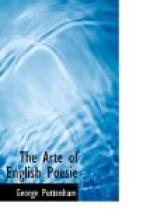Some perchance would thinke that next after the praise and honoring of their gods, should commence the worshippings and praise of good men, and specially of great Princes and gouernours of the earth; in soueraignety and function next vnto the gods. But it is not so, for before that came to passe, the Poets or holy Priests, chiefly studied the rebuke of vice, and to carpe at the common abuses, such as were most offensiue to the publique and priuate, for as yet for lacke of good ciuility and wholesome doctrines, there was greater store of lewde lourdaines then of wife and learned Lords, or of noble and vertuous Princes and gouernours. So as next after the honours exhibited to their gods, the Poets finding in man generally much to reproue & litle to praise, made certaine poems in plaine meetres, more like to sermons or preachings then otherwise, and when the people were assembled togither in those hallowed places dedicate to their gods, because they had yet no large halles or places of conuenticle, nor had any other correction of their faults, but such as rested onely in rebukes of wife and graue men, such as at these dayes make the people ashamed rather then afeard, the said auncient Poets used for that purpose, three kinds of poems reprehensiue, to wit, the Satyre, the Comedie, & the Tragedie: and the first and most bitter inuectiue against vice and vicious men, was the Satyre: which to th’intent their bitternesse should breede none ill will, either to the Poets, or to the recitours, (which could not haue bene chosen if they had bene openly knowen) and besides to make their admonitions and reproofs seeme grauer and of more efficacie, they made wife as if the gods of the woods, whom they called Satyres or Silvanes, should appeare and recite those verses of rebuke, whereas in deede they were but disguised persons vnder the shape of Satyres as who would say, these terrene and base gods being conuersant with mans affaires, and spiers out of all their secret faults: had some great care ouer man, & desired by good admonitions to reforme the euill of their life, and to bring the bad to amendment by those kinde of preachings, whereupon the Poets inuentours of the deuise were called Satyristes.
CHAP. XIIII.
How vice was afterward reproued by two other maner of poems, better reformed then the Satyre, whereof the first was Comedy, the second Tragedie.
Bvt when these maner of solitary speaches and recitals of rebuke, vttered by the rurall gods out of bushes and briers, seemed not to the finer heads sufficiently perswasiue, nor so popular as if it were reduced into action of many persons, or by many voyces liuely represented to the eare and eye, so as a man might thinke it were euen now a doing. The Poets deuised to haue many parts played at once by two or three or foure persons, that debated the matters of the world, sometimes of their owne priuate affaires, sometimes of their neighbours,




